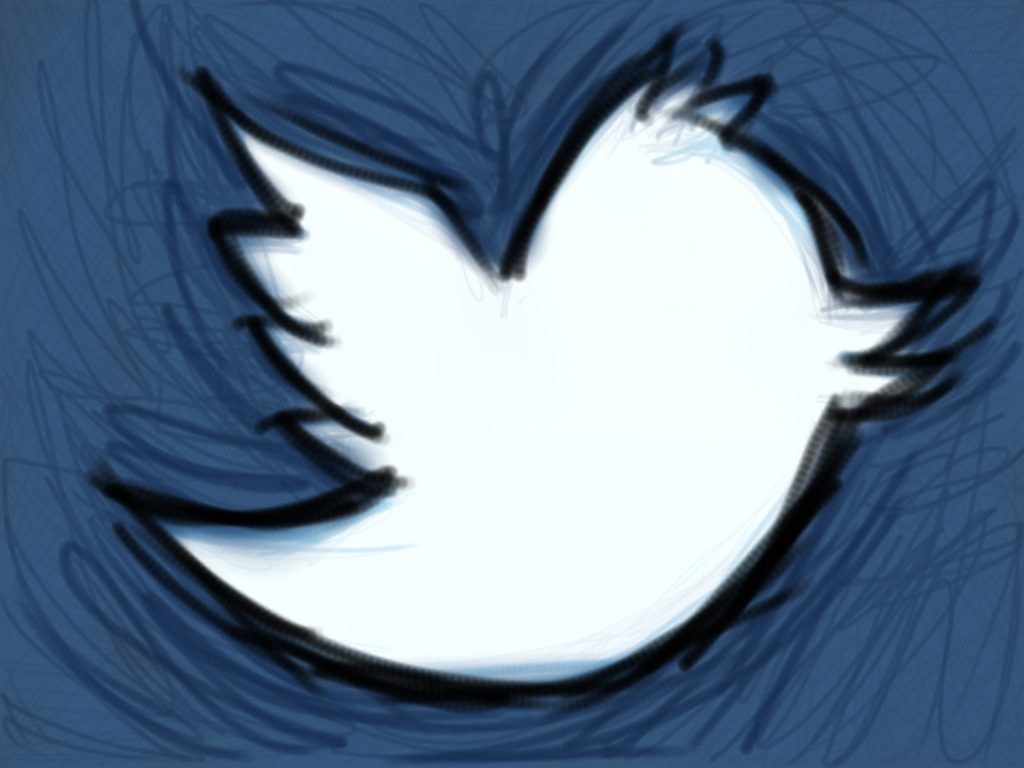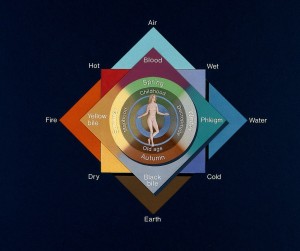“For any women who are compelled, against their wishes, to wear a Hijab, I would fully support such a notion [to arrange a #TakeOffYourHijab day in solidarity with the Iran protests]. Similarly, I would not like to see any woman compelled, against her wishes, to remove her Hijab either”.
I tweeted this on 31st December last year, in response to the suggestion by – counter-extremist, author, broadcaster and Founding Chairman of Quilliam – Maajid Nawaz that, what he calls the ‘regressive left’ would not support a Take Off Your Hijab Day, even though they have been vocal in their support of World Hijab Day. It’s an uncontroversial response in what I think was an interesting and important debate (one that had been inspired by the Iranian protests which were ongoing at the time). However, it’s not the content of this debate that I want to discuss here but what happened next and how it caused me to reflect 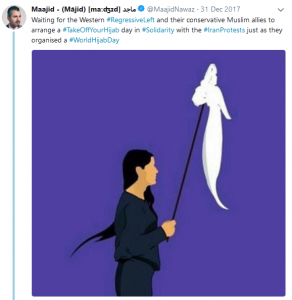 on my overall experience of Twitter (and online communication in general).
on my overall experience of Twitter (and online communication in general).
I’ve had loads of debates and disagreements on Twitter. These have covered a whole range of subjects and have involved people from a wide range of political backgrounds. I’ve debated with left-wing Jeremy Corbyn supporters about media bias and Donald Trump supporters about gun control, but the issue of Muslim women wearing head coverings, and the comments that I made about it, seemed to inspire a level of hostility that I hadn’t encountered on Twitter before. Now, I should say right away that, although it felt abusive at times, what I experienced was still extremely mild compared to what others – notably women – can, and do, experience on a disturbingly regular basis. Nevertheless, it was still quite shocking and, while I’m not one who takes offence very easily, it became pretty overwhelming. This was partly because of the frequency with which the criticisms came, but it was more to do with the nature of the onslaught. My points were largely being ignored in favour of increasingly personal attacks. Eventually, feeling deflated and tired following twenty-four hours of Twitter exchanges, I muted the conversation (meaning I could only view my own previous posts, but would not see anything else) and reported some of the most abusive participants, thereby bringing my role in the discussion to an end.
This spiral into uncivilised discourse all seems rather predictable. It’s a common trope to point out the negative and harmful effects of Twitter, and other forms of social media; it is often discussed by the public and widely reported upon by the media. I don’t want to play down this aspect of social media; it is real, it can have extremely severe consequences and there has not yet, in my opinion, been anyway near enough done to address it – by either the companies involved, various governments, or society in general. Online bullying, shaming, threats of rape, and the spread of destructive ideologies are just a few examples of a problem for which endless discussion has led to little in the way of meaningful action. Nonetheless, my experience, as described above, affected me in a way that was as intense and vivid as it was surprising. My initial weariness passed quite quickly, and what I was left with was the realisation that the overwhelming majority of my experiences on Twitter have  been positive. Sometimes deeply so.
been positive. Sometimes deeply so.
Sure, as I said before, I’ve had lots of debates and arguments that have often felt intense and fractious, but even these have been positive in one way or another. Even in some of the most impassioned debates, people have been civil and have tended to focus on the points being made, rather than resorting to personal insults. Inevitably, such encounters have ended with an agreement to disagree and a mutual well-wishing from each party. To my mind, the point of such arguments is not to change anyone’s mind – the chance of being successful on a platform like Twitter is miniscule – but to allow parties of differing political persuasions and opinions to understand why someone might think differently to them.
While I don’t doubt that there is a problem with some people swaddling themselves in the safety of their carefully constructed echo-chamber, this hasn’t been my experience. Brexiters and Trump supporters regularly respond to, and challenge, things that I have written – and I’m always pleased when they do. For my part, I try very hard to stick to a few simple rules that include: never passing comment on personal features and traits, and never ridiculing people for spelling and grammatical errors. Although, my biggest weakness, I have to admit, is a tendency for sarcasm. I am frequently sarcastic on Twitter – much more than I am in ‘real life’ – but I do think it serves a useful purpose. I try not to be sarcastic about the things detailed above; instead, I usually use sarcasm to highlight, what I think, is a logical error in someone’s argument or just to try and be humorous about something frivolous. What the former often achieves is the provocation of a response, in a way that blandly pointing out a perceived mistake rarely does, meaning that the issues can then be discussed in greater detail.
Of course a large part of Twitter activity doesn’t involve abuse, or politically infused arguments; most of it consists of superficial attempts to provide stimulation of the neurological pleasure receptors: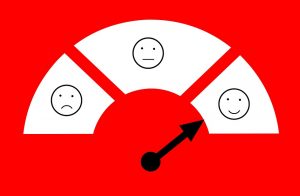
Post something that you hope is interesting or funny.
Receive a ‘like’.
Experience an instant, but short lived feeling of satisfaction (or not, if your post doesn’t get any response at all).
Despite this apparently shallow cycle, Twitter (and the wider world of internet communication) can be, and frequently is, the source of meaningful personal encounters and opportunities that might not otherwise be possible. In the spring of last year, I was struggling to find the motivation I needed to finish an assignment. I was reading the news, making repeated trips to the cupboard for snacks, listening to music, staring into space and, naturally, checking Twitter. As part of this particularly long bout of procrastination I constructed and posted some frivolous tweets – hoping, of course, for another short-lived hit of dopamine. One such Tweet was a comment on my current efforts of procrastination alongside a wish to obtain just a small portion of – Art Historian, Oxford University lecturer, author, TV presenter and enthusiastic Tweeter – Dr. Janina Ramirez’s – apparently (as anyone who follows her work will know) endless levels of energy. These kinds of Tweets rarely get any response at all, so I was surprised when Janina replied. Although it was a small gesture I was struck by the kindness of it. I wasn’t commenting on something she was trying to sell, and she didn’t need to respond; I was quite happy throwing Tweets into the, usually unresponsive, abyss. Instead, I received my sought-after hit and also enjoyed a fresh wave of motivation, with which I was able to complete the assignment (for which I received my highest mark of the previous few years).
Anyway, to take a sharpened cleaver to a rather long story, this simple sharing of Tweets led to my attending the wonderful Gloucester History Festival, where I was able to chat with Janina, who is the President of the festival, along with some of her supporters and friends – a few of whom I had briefly communicated with on Twitter before. One of the  main things that struck, and surprised, me about this experience was how easy it was to speak to those people I had met previously on Twitter. Although I don’t avoid crowds (I quite enjoy them), I don’t usually feel very comfortable meeting a lot of new people and can be perfectly happy staying in the background, either on my own or with a small group of friends. On this occasion, however, the joy of meeting people who I’d only known online, and getting on well with them, was quite emotional and even a little overwhelming. Since then I regularly converse with the people I met there, and now consider them (Janina included) to be friends. That such meaningful relationships are possible from relatively flippant tweets is a wonder, and stands firmly in opposition to the characterisation of social media as a vacuous and futile cesspit.
main things that struck, and surprised, me about this experience was how easy it was to speak to those people I had met previously on Twitter. Although I don’t avoid crowds (I quite enjoy them), I don’t usually feel very comfortable meeting a lot of new people and can be perfectly happy staying in the background, either on my own or with a small group of friends. On this occasion, however, the joy of meeting people who I’d only known online, and getting on well with them, was quite emotional and even a little overwhelming. Since then I regularly converse with the people I met there, and now consider them (Janina included) to be friends. That such meaningful relationships are possible from relatively flippant tweets is a wonder, and stands firmly in opposition to the characterisation of social media as a vacuous and futile cesspit.
My very involvement with the Middle Way Society, and the friendships I’ve made within it, were also made possible through online communication. If I hadn’t become involved in a debate about the definition of religion on an online forum several years ago then I wouldn’t be writing this, and nor would I have subsequently had so many wonderful opportunities. My experience of meeting founding members Robert and Barry (at what I thought was a Secular Buddhist UK retreat, but was in fact a kind of committee meeting for a soon-to-be-no-more organisation), was similar to the one I later had in Gloucester. We’d all been involved in several discussions on the aforementioned forum and, on eventually meeting in person, we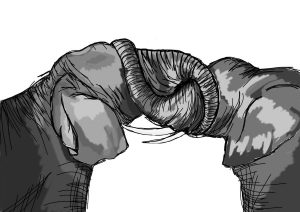 seemed to know each other better than I had expected. Robert, Barry and Peter (who I met at the same time online, but later in person) quickly became dear friends. Following the ensuing foundation of the Middle Way Society, I was asked if I’d like to join, which – after some hesitation (I’ve always been wary of becoming part of a ‘group’) – I agreed to do, as well as agreeing to become a member of the committee. This has meant I’ve been able to push myself and achieve things that I never thought I would – like writing blogs, for instance.
seemed to know each other better than I had expected. Robert, Barry and Peter (who I met at the same time online, but later in person) quickly became dear friends. Following the ensuing foundation of the Middle Way Society, I was asked if I’d like to join, which – after some hesitation (I’ve always been wary of becoming part of a ‘group’) – I agreed to do, as well as agreeing to become a member of the committee. This has meant I’ve been able to push myself and achieve things that I never thought I would – like writing blogs, for instance.
There are many problems with Twitter (and social media in general), but there are also many positives. We are still learning how to use this relatively new form of interaction; we are still immature and naïve. Even so, I feel confident that we’ll learn how to make use of social media with more maturity and care than we currently do. Part  of the problem is that this new frontier of communication gives the illusion that we are not dealing with embodied human beings, but lines of text generated from an abstract source. This has the effect of reducing our sense of social responsibility and shielding users from the effects that they have on others. Social conventions and restrictions can, when implemented wisely, serve as cohesive and stabilising forces. These have yet to develop fully, or effectively, in cyberspace and it remains difficult to predict what form they will eventually take, but I nonetheless believe that things will get better. By highlighting and encouraging that which is beneficial, as well as highlighting and challenging that which is harmful, we can begin to negotiate a Middle Way between the extremes of an imagined online utopia on the one hand and an online world that is categorised as a threat to society itself on the other.
of the problem is that this new frontier of communication gives the illusion that we are not dealing with embodied human beings, but lines of text generated from an abstract source. This has the effect of reducing our sense of social responsibility and shielding users from the effects that they have on others. Social conventions and restrictions can, when implemented wisely, serve as cohesive and stabilising forces. These have yet to develop fully, or effectively, in cyberspace and it remains difficult to predict what form they will eventually take, but I nonetheless believe that things will get better. By highlighting and encouraging that which is beneficial, as well as highlighting and challenging that which is harmful, we can begin to negotiate a Middle Way between the extremes of an imagined online utopia on the one hand and an online world that is categorised as a threat to society itself on the other.
You can hear our 2016 podcast about public shaming on social media with, journalist and author, Jon Ronson here.
If you are, or know someone who is, experiencing online abuse then these links provide advice of what you can do:
http://www.stoponlineabuse.org.uk/
https://www.vice.com/en_uk/article/bjp8ma/expert-advice-on-how-to-deal-with-online-harassment
All pictures courtesy of Wikimedia Commons and licenced for reuse.

